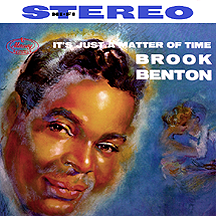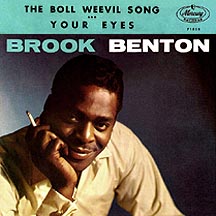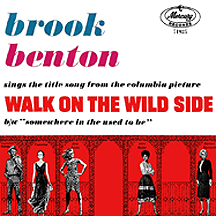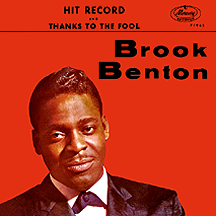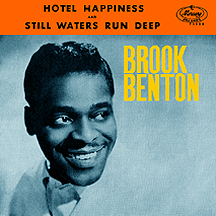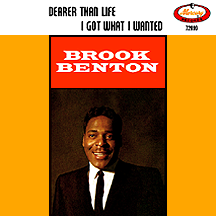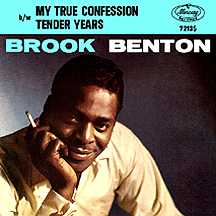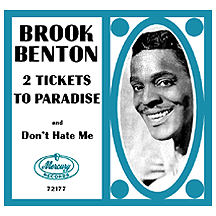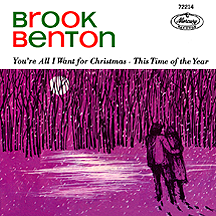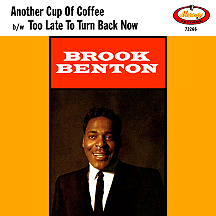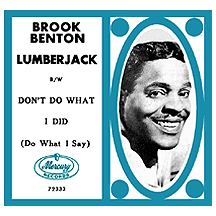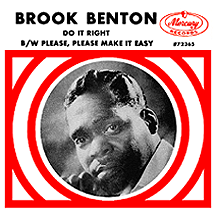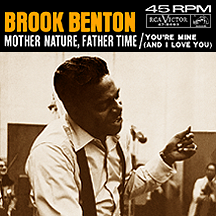BROOK BENTON
When discussing the subject of the greatest singers who ever lived, Brook Benton's name should come up every time. Why he's underappreciated or largely overlooked in the grand musical scheme of things is a mystery to me. He possessed a rich baritone with those low, low notes always thrown in at the right moment for effect. There are few vocalists of his caliber, and the variety of song types he tackled over the years amounts to nothing less than a highly entertaining body of work. When he passed away on April 9, 1988 of pneumonia brought about by complications from spinal meningitis, I was devastated. He was 56 years old. One of the magnificent singers of our times had left us too soon.
Benjamin Franklin Peay (pronounced "P.A.") was born in 1931. Young Benny grew up in the small community of Camden, South Carolina and began singing in the choir at his church around the age of ten, staying with it into his teens. When later asked if he had ever had a chance to perform at any nightclubs, he said there weren't any in Camden: "Church gatherings were our nightclub." To help support his family, Benny started doing odd jobs at the age of 12, including pressing pants and working at a dairy. Sometime in the late 1940s he moved to New York City and sang with several gospel groups. After a short time with The Golden Gate Quartet, he had a longer run with The Jerusalem Stars, which featured bass singer Bill Pinkney, later with The Drifters (well remembered for his lead vocal on the group's 1954 seasonal hit "White Christmas"). Going secular was in Benny's sights too, and soon he would follow Pinkney into that comptetitive field.
While touring in 1954, Benny Peay met Roy Hamilton and became friends with successful New Jersey disc jockey Bill Cook, who happened to be Hamilton's manager. Roy was on a hot streak at the time (with three hits that year, including the number one R&B smash "You'll Never Walk Alone") and Cook must have had a good ear for dynamic baritone singers; before Benny knew it he was leading The Sandmen, supported by three other strong vocalists, Adriel McDonald (recently split from The Ink Spots after about three years with the group), Thurman Haynes and Walter Springer. Cook took the quartet to Okeh Records for an audition, where they were signed primarily because of Benny's "Hamiltonesque" sound.
First up for the Sandmen was Cook composition "Somebody to Love" with an arrangement by 21-year-old Quincy Jones, a conventional debut single, but with a smoothly rendered lead vocal by Benny. When the early 1955 release failed to connect, the group sat in as background singers on sessions for Chuck Willis (one of Okeh's hot acts at the time), Lincoln Chase and others. Marvin Holtzman had been a musician at Columbia Records (Okeh's parent label) for some time and more recently found himself in charge of A&R for Okeh. Changing Peay's name to Brook Benton was his idea; the other three group members were understandably miffed when the second single, Quincy's "Ooh," was surprisingly credited to Benton with the Sandmen mentioned in small print. Worse still for them, the other side, Irving Gordon's "The Kentuckian Song" (from the '55 film The Kentuckian starring Burt Lancaster), was credited solely to Benton. Hurt feelings and a subsequent executive decision split the group, and Brook Benton became a solo artist with future releases assigned to Columbia's Epic label with plans to give him a big promotional buildup in the same way they had successfully done with Roy Hamilton.
Lightning doesn't usually strike twice, does it? The closest Brook came to repeating anything resembling Roy's success during his year or so with Epic was "The Wall," an Ormay Diamond-Cliff Owens-Dave Dreyer song that became a minor hit in competing versions by Patti Page and Eileen Rodgers, leaving Brook out of the loop. On the bright side, Epic encouraged him to work on his songwriting, an aptitude he'd shown years earlier. He wrote dozens of songs during this time, even recording a few for the label before his contract ended in 1957 and he was obliged to look for a better opportunity elsewhere. What happened next might seem a step backwards to many in the record business, but it ultimately worked to Brook's advantage. He began making demos, quickly- and simply-arranged recordings for songwriters to shop around to potential artists and record producers. Sometimes these demonstration discs elicited little interest in a particular song, but comments like "Who's that singing?" drew attention to the anonymous singer.
During this demo period he met Clyde Otis, an up-and-coming songwriter-producer whose main credit as of '57 was Nat "King" Cole's hit version of his song "That's All There is to That" (cowritten with Kelly Owens). Benton signed with RCA Victor subsidiary Vik Records, where Otis was employed, and the two began a long association. Vik bosses liked Benton's sound and style, seeing him as a potential "Black Elvis." For a time they tried to promote him similarly with material that, while not as rockin' as RCA phenomenon Presley's, nevertheless possessed an attitude designed to appeal to a teen audience. Vik act Teddy Randazzo, as yet hitless, liked some of the songs Brook had written and performed one, "Kiddio," in the film Mister Rock and Roll starring Alan Freed, which also included Benton singing "If Only I Had Known" and, briefly, one other song.
Back to Chuck Willis for a moment. An Atlantic artist by this time, he was at his career peak with hits like "C.C. Rider." That song in particular (a remake of Ma Rainey's 1925 classic "See See Rider Blues") had started the "stroll" dance craze in the spring of '57, distinctive in that it took place with two rows of dancers - men on one side and women on the other - with one couple at a time coming together to dance down the middle. Clyde Otis and Nancy Lee capitalized on the popular dance, writing "The Stroll," using the same beat as Willis's record. Benton sang the demo. Mercury Records act The Diamonds had the hit. Soon after, efforts of the Vik promotion staff helped raise Benton's profile with "A Million Miles From Nowhere," written by Daryl Petty, a bigger production than usual based partly on The Diamonds' arrangement of earlier hit "Little Darlin'" (itself a copy of the original by The Gladiolas). With Brook's reverb-drenched vocals, it appeared briefly on the charts in March 1958, his first recording to break through nationally.
Having established an "in" with Nat "King" Cole, Otis offered the singing legend a song he had written with Benton and Belford Hendricks that he felt was tailor-made for the singer. He was right. "Looking Back" added to Nat's string of top ten hits in the spring of '58. Next, Brook approached Ahmet Ertegun and Jerry Wexler at Atlantic with his demo of "A Lover's Question" (cowritten with Jimmy T. Williams) as a good fit for Clyde McPhatter. It was. The song went top ten in December (and number one R&B), becoming his biggest post-Drifters hit in the process. With two top ten hits now under his belt, Brook was a hot songwriter. Other artists who recorded Benton songs over the next couple of years include Ruth Brown ("I Don't Know") and Bobby Bland ("I'll Take Care of You").
Cole was very open to doing more Benton material, but Clyde Otis had different plans. After "The Stroll," Mercury became interested in the producer, offering him the unique position of creative director out of the label's New York offices. He and Benton left Vik at the same time and signed with Mercury, though Brook considered a serious offer from Atlantic Records before joining Otis, deciding he would be better off working in a comfortable environment with his collaborator of the past couple of years. Clearly it was the right move, as Otis implemented a concept he had for the still-twenty-something singer: prominent strings, arranged and conducted by Hendricks, would provide the backing for Brook's baritone, a "cool and warm" combination designed to stand out from what everyone was doing in the late 1950s. Brook was unsure of the idea and a bit frustrated by what was already nearly half a decade without a real hit to his name as a singer. Clyde told him, "It's just a matter of time, Brook." String arrangements had been avoided for the most part by rhythm and blues acts (top-selling Mercury group The Platters being a notable exception) and the more pop-oriented singers like Cole had used them sparingly. To apply them to something akin to rock and roll was unheard of...but not for long! In a matter of months, string sections would be in high demand for rock- and teen-oriented sessions. All it took was for Brook Benton to take that first step and get it going.
Clyde Otis's words were more accurately prophetic than Brook could have imagined. With Hendricks, the songwriting team penned "It's Just a Matter of Time," with Benton's low notes set against those cool strings while avoiding anything remotely maudlin. The result was a record that crossed boundaries, reeling in pop, rock and R&B fans, even gaining a modicum of respect among hard-to-please jazz aficionados (some comparing his style to Billy Eckstine). The song went top ten on the pop charts in March 1959 and number one rhythm and blues at the same time; over two months at the top of the R&B charts, in fact, more than any other record that year. The uptempo flip, "Hurtin' Inside," while only a minor chart hit, indicated he was still experimenting with Elvis Presley-styled material. Many rock acts, it turns out, had developed a respect for Benton's talents (Gene Vincent's all-time favorite singer!) After returning from the Army in 1960, it sounded as though a few recordings by Elvis himself may have been Benton-inspired.
Big hit singles followed in '59, most written by Otis, Benton and/or Hendricks: the big string number "Endlessly," backed with an intimate piano-bar-style low-note showcase "So Close," "Thank You Pretty Baby" (another R&B number one), Bobby Stevenson's "So Many Ways" (yet another R&B chart-topper) and at year's end the purely magical Cliff Owens-Jesse Hollis Christmas classic "This Time of the Year." While a number of acts had a benchmark year in '59 including Connie Francis, Lloyd Price, Fats Domino, Bobby Darin and others, you'd be hard-pressed to find anyone hotter those last 12 months of the decade than Brook Benton.
Otis didn't stop there. Once Benton was on top, he and Hendricks used the string arrangement concept to revive the career of blues and R&B great Dinah Washington starting with "What a Difference a Day Makes," then they gave Sarah Vaughan a dose of the Otis-Hendricks formula and an immediate smash, "Broken Hearted Melody." At the start of 1960, Otis decided to put Benton and Washington together to sing some duets, knowing it might be risky but reasoning that one hot act plus another hot act equals more hits. Commonplace in the big band era, duets in the mid- to late-'50s were typically by acts that were formed as duos; the gimmick of putting two established stars together hadn't been done successfully since perhaps 1956, when Bing Crosby and Grace Kelly had a one-shot hit with "True Love" from the movie High Society. It was not, as of yet, a rock era practice (but would be much more popular later in the '60s, most notably in the case of Marvin Gaye and his string of hits with three different duet partners and Nancy Sinatra, who did the trick with two). Dinah and Brook met for the first time just before the session began and sparks flew...on the charts, yes, but first in the recording studio...and later in public!
"Baby (You've Got What it Takes)" was the spunky, even sexy, result while being a contrast in two sets of work ethic. While Washington came prepared and took a by-the-book approach to recording, Benton tended to be more loose in the studio, ad-libbing and sometimes making changes on the fly. The two clashed almost immediately, when Brook stepped on one of Dinah's lines during "Baby" and she was quick to remind him 'You're in my spot again, honey' (suggesting he had goofed on previous takes). Dinah got mad at Brook, which put him on the defensive. An album was planned, but after the completion of just four songs, Dinah left the studio and never returned (the album came out anyway, using four solo efforts by each singer as filler). Clyde Otis went ahead and released the take with the mistakes left in, saying he thought it was "cute." Brook was not happy about it. Dinah was...well, Dinah got so upset she had a problem keeping her feelings to herself.
The record, of course, was a monster. Top ten pop and number one on the R&B chart for ten weeks! A story has been handed down about Otis and Benton attending a club in Chicago where Dinah was performing. During her show she made comments about "that dumb (expletive) who couldn't get the words right" and Brook replied by yelling back from the audience using equally rough language, then Otis and Ray Charles (who was also in attendance) had to restrain him as he seemed to be making a move to run up on the stage and clock 'er one! Clearly this was a musical team that would not be touring together. All four of the recorded duets were released on 45; the next A side being "A Rockin' Good Way (To Mess Around and Fall in Love)," also top ten pop and number one R&B. Whether or not the public realized there was tension between the two, they loved the songs. Brook and Dinah, separately and together, were major stars in 1960.
A year and a half into his hot streak by that time, critics began disparaging Brook Benton's music (and Dinah's); one reviewer called it "pop pap." Other than the duets, Benton's hits had been mainly romantic ballads, so he began to change things up a little midyear. "Kiddio," introduced by Randazzo in Mister Rock and Roll three years earlier, was the next single, and it too went top ten pop and settled in for a long stay at number one R&B in the fall of '60. The 1940 Johnny Mercer-Rube Bloom standard "Fools Rush In" got the string-laden (but uptempo) treatment as the year's final hit, another big one. As of the end of that second year of nonstop success, Brook had sent six records to number one on the rhythm and blues charts, including the biggest R&B hit of 1959 ("It's Just a Matter of Time") and the top two of the year 1960 ("Baby" with Washington and "Kiddio").
The hits kept coming in 1961, though at a less spectacular rate, but considering he'd been at his peak for two years running it came as no surprise. Hits that year, written by varying combinations of Benton, Otis and Hendricks (with Randazzo and Willie Dixon in the mix) included "For My Baby," "Think Twice" and "The Boll Weevil Song," the latter the latest in a long line of southern-style folk tunes lamenting the gray beetle's devastating effect on cotton crops since the 1920s. Benton took a humorous approach, describing a perceived conversation between aggressor and victim: 'The farmer said to the boll weevil, say why'd you pick my farm?...The weevil just laughed at the farmer 'n said, we ain't gonna do you much harm!' It was Benton's biggest pop hit, going to number two in July 1961 behind the year's number one single, "Tossin' and Turnin'" by Bobby Lewis. For the follow-up, he tackled another traditional subject, the oft-told tale of "Frankie and Johnny" (later a hit for both Sam Cooke and Elvis).
As 1961 came to a close, Brook continued experimenting with different types of music. Every single release through the end of '62 revealed another layer of his musical depth: late '61 single "Revenge," written by Benton with Oliver Hall and Marnie Ewald, juxtaposed strings against a big brass presence with dynamic results. He followed it with an entire album of inspirational songs, If You Believe, and a rousing version of a Robert MacGimsey song dating to the 1930s that varied from the hymnal tone of the album's other tracks; the story of "Shadrack" and his companions from the book of Daniel, Meshach and Abednego, followed the trio into and out of the 'fiery furnace' and was a top 20 hit in February. Next up was the theme from the movie "Walk on the Wild Side," written by Elmer Bernstein and Mack David; Benton's recording was featured during the closing credits of the film. The song had a religious message of its own, though harsher than the recent gospel recordings (with lyrics like 'One day of of prayin' and six nights of fun...the odds against going to heaven six to one'). It was nominated for a Best Song Academy Award, but Brook missed his chance to perform it on the awards show when producers opted to have Robert Goulet do a medley of all five nominees (the Henry Mancini-Johnny Mercer theme "Days of Wine and Roses" was the winner).
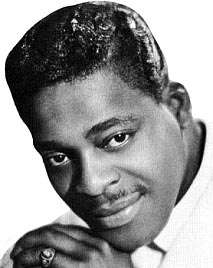
Many serious artists of the day avoided novelty songs, but with hits like "Boll Weevil" and "Shadrack" leaning in that direction, Brook went full-on with the next single, Sibelius Williams' ludicrous yet hilarious instruction on how to make a "Hit Record." Hamming it up like never before (or after) with a big brass sound and boisterous female background singers, the result fell just short of the top 40, denying its title the ring of truth. Bluesy fall 1962 hit "Lie to Me" fared better, nearly reaching the top ten. Much of the reason for Benton's change in musical approach was due to producer Shelby Singleton, who took the reins in '62 after Otis left the label over a music royalty difference of opinion. Singleton's background was in country and most of the productions he'd been involved with since coming to Mercury (including "Wooden Heart" by Joe Dowell and "Hey! Baby" by Bruce Channel, both number one hits on the company's Smash imprint) were at least a little bit countrified. Benton wasn't too keen to lean this way (aware that Singleton had also produced the runaway pop/soul hit "Lover Please" for Clyde McPhatter, a Mercury act since 1960) but agreed to try something new. "Hotel Happiness" did have a little of that country flavor and became one of his biggest hits, making the top ten in early 1963.
The new year brought more top 40 hits as Benton moved ever closer to a country sound. He wrote "I Got What I Wanted" with country singer-songwriter Margie Singleton (Shelby's wife) and managed a soulful turn with "My True Confession," written by Margie and Ray Stevens, both arranged by former Sun Records artist Bill Justis. After "Two Tickets to Paradise" (cowritten with Malcolm Dodds, one of his arrangers during this time), he teamed with Mercury diva Damita Jo in an effort to recreate the spark of the smash Dinah Washington duets from three years earlier (Dinah, shockingly, died of a drug overdose shortly afterward at the age of 39). "Stop Foolin'" and the too-obviously titled "Baby, You've Got it Made" were good efforts, but something was lacking (though in Damita's case, behind-the-scenes tension was thankfully nonexistent). The hoped-for hits just didn't happen.
Shelby Singleton oversaw all of the production as a variety of arrangers were shuffled through a swinging door during Benton's last two years at Mercury. One highlight was "A House is Not a Home," the second box office film to feature Brook singing the theme, but as much as this romantic pop performance rose above the level of most, it didn't do well on the charts. Ready for a change, he opted out of his contract when it came due in 1965, returned to his previous affiliation with RCA Victor and reteamed with Clyde Otis, who had recently set up shop in his former digs. The first single, "Mother Nature, Father Time," was a modest hit, but two years of trial and error produced no marketable follow-up. In '67 he moved to Reprise, but the only record there to make any noise was the depressing "Laura (Tell Me What He's Got That I Ain't Got)," which competed unsuccessfully that summer with a version by Frankie Laine.
Atlantic Records had been interested in Benton ever since they'd heard his demo of "A Lover's Question" back in 1958. Why it took him ten years to take them up on on their standing offer is anyone's guess...it was a timing thing, perhaps. When he signed to appear on the Cotillion imprint in 1968, Jerry Wexler guided the singer much in the same way he had done with Aretha Franklin and others. Sessions were held at the FAME studios in Muscle Shoals, Alabama and Criteria in Miami with top southern musicians and a southern soul game plan all the way. The Jerry Leiber-Mike Stoller production of "Do Your Own Thing" in '68 and "Nothing Can Take the Place of You," a Patrick Robinson-Toussaint McCall song produced by Arif Mardin in '69, showed promise and at the very least gave him two placings on the charts, something neither of the two previous record companies had been able to do.
Tony Joe White had been a top ten hitmaker in '69 with "Polk Salad Annie," and it was a song he'd written, "Rainy Night in Georgia," that became the home run Brook Benton was seeking. An atmospheric production by Mardin, the record showed the singer's vulnerable side like never before. In early 1970, he landed in the top ten for the first time in seven years and returned to number one on the R&B chart, the seventh chart-topper of his career, ranking him among the top recording acts of all time. Album sales were stronger than they'd been in nearly a decade and successive singles, including Joe South's "Don't it Make You Want to Go Home," kept him hitting in the midranges of the charts for the next couple of years.
After his time with Atlantic ran its course, he bounced around from label to label for the rest of the decade. He had exposure on a television commercial for Miller beer as one of the first artists (in addition to country singer Johnny Mack and rock group The Troggs) to perform the brand's famous 'If you've got the time, we've got the beer" jingle, also releasing a single on MGM, "If You've Got the Time," sans beer references. Live shows were his bread and butter after that, with one final R&B chart single in 1978, "Makin' Love is Good For You," helping to keep his name out there and the bookings coming. He continued to work and delight audiences into the '80s, right up until that abrupt end. For some, Brook Benton has been all but forgotten. To a younger generation, his rich voice and uniqueness is overlooked, unheard, unmissed. Others, like myself, still miss him. But we have his records. And there are lots of them.
NOTABLE SINGLES:
- Somebody to Love - 1955
by the Sandmen - The Wall - 1957
- If Only I Had Known - 1957
- A Million Miles From Nowhere - 1958
- It's Just a Matter of Time /
Hurtin' Inside - 1959 - Endlessly /
So Close - 1959 - Thank You Pretty Baby /
With All of My Heart - 1959 - So Many Ways - 1959
- This Time of the Year - 1959
- Baby (You've Got What It Takes) - 1960
with Dinah Washington - The Ties That Bind /
Hither and Thither and Yon - 1960 - A Rockin' Good Way (To Mess Around and Fall in Love) - 1960
with Dinah Washington - Kiddio /
The Same One - 1960 - Fools Rush In /
Someday You'll Want Me to Want You - 1960 - For My Baby /
Think Twice - 1961 - The Boll Weevil Song - 1961
- Frankie and Johnny /
It's Just a House Without You - 1961 - Revenge - 1961
- Shadrack /
The Lost Penny - 1962 - Walk on the Wild Side - 1962
- Hit Record - 1962
- Lie To Me - 1962
- Hotel Happiness /
Still Waters Run Deep - 1963 - Dearer Than Life /
I Got What I Wanted - 1963 - My True Confession - 1963
- Two Tickets to Paradise - 1963
- Stop Foolin' - 1963
with Damita Jo /
Baby, You've Got it Made - 1963
with Damita Jo - You're All I Want For Christmas - 1963
- Going Going Gone - 1964
- Too Late to Turn Back Now /
Another Cup of Coffee - 1964 - A House is Not a Home - 1964
- Lumberjack - 1964
- Do It Right - 1964
- Love Me Now - 1965
- Mother Nature, Father Time - 1965
- Laura (Tell Me What He's Got That I Ain't Got) - 1967
- Do Your Own Thing - 1968
- Nothing Can Take the Place of You - 1969
- Rainy Night in Georgia - 1970
- Don't it Make You Want to Go Home - 1970
with the Dixie Flyers - Shoes - 1971
with the Dixie Flyers - If You've Got the Time - 1972
- Makin' Love is Good For You - 1978


